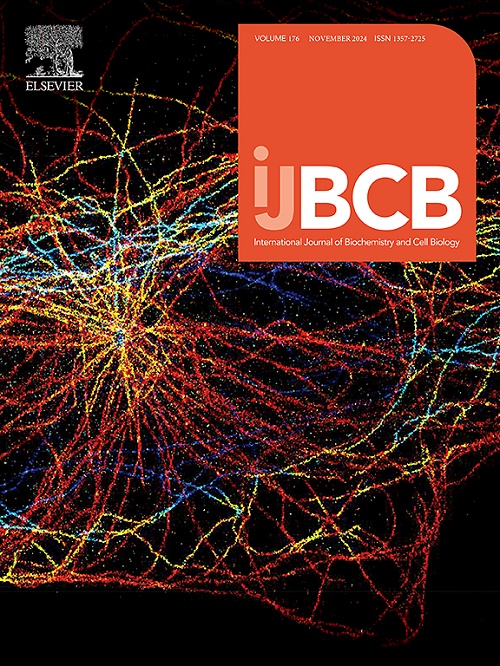阿卡拉布替尼通过调节胆汁酸代谢减轻代谢功能障碍相关的脂肪变性肝病
IF 2.8
3区 生物学
Q2 BIOCHEMISTRY & MOLECULAR BIOLOGY
International Journal of Biochemistry & Cell Biology
Pub Date : 2025-04-28
DOI:10.1016/j.biocel.2025.106786
引用次数: 0
摘要
代谢功能障碍相关脂肪变性肝病(MASLD)是一种全球流行的慢性肝病,目前缺乏有效的治疗方法。评估现有药物对MASLD的治疗效果是一种既省时又划算的策略。布鲁顿酪氨酸激酶(Bruton's tyrosine kinase, BTK)是一种炎症信号分子,在MASLD的进展中起重要作用。Aclabrutinib是一种BTK抑制剂,已被批准用于治疗斗篷细胞淋巴瘤和慢性淋巴细胞白血病,但尚未对其治疗MASLD的潜力进行研究。本研究采用高脂饮食诱导小鼠模型,研究阿克拉替尼对MASLD的治疗作用及其机制。结果显示,阿克拉鲁替尼可显著缓解与MASLD相关的病理参数。TSE PhenoMaster结果显示,阿克拉替尼增加了小鼠的能量消耗。此外,aclabrutinib上调了脂肪组织中与产热和脂肪分解相关的基因的表达。此外,它抑制了小肠和肝脏中脂质吸收相关基因的转录,同时增加了肝脏中激素敏感脂肪酶、肝核因子4 α和成纤维细胞生长因子21的表达。进一步分析表明,阿克拉鲁替尼促进了胆汁酸合成的替代途径,同时恢复了肠道微生物群的稳态。胆汁酸谱的改变上调了脂肪组织中G蛋白偶联胆汁酸受体1的表达,以及肝脏和小肠中维生素D受体的表达。我们的研究结果表明,aclabrutinib可能通过调节胆汁酸代谢和肠道微生物群,促进产热和脂肪分解,从而缓解MASLD。本研究为BTK治疗MASLD的临床应用提供了新的见解。本文章由计算机程序翻译,如有差异,请以英文原文为准。
Acalabrutinib alleviates metabolic dysfunction–associated steatotic liver disease by regulating bile acid metabolism
Metabolic dysfunction–associated steatotic liver disease (MASLD) is a global epidemic of chronic liver disease currently lacking effective treatment. Evaluating the therapeutic effects of existing drugs on MASLD is a time and cost-effective strategy. Bruton's tyrosine kinase (BTK) is an inflammatory signaling molecule playing an important role in the progression of MASLD. Aclabrutinib, a BTK inhibitor approved for treating mantle-cell lymphoma and chronic lymphocytic leukemia, has not been investigated for its potential to treat MASLD. This study examined the therapeutic effects and mechanisms of aclabrutinib on MASLD using a high-fat diet-induced mouse model. Results demonstrated significant alleviation of pathological parameters associated with MASLD upon administration of aclabrutinib. TSE PhenoMaster results revealed that aclabrutinib increased energy expenditure in mice. Furthermore, aclabrutinib upregulated the expression of genes associated with thermogenesis and lipolysis in adipose tissues. Additionally, it inhibited the transcription of genes related to lipid absorption in the small intestine and liver, while increasing the expression of hormone-sensitive lipase, hepatic nuclear factor 4 alpha and fibroblast growth factor 21 in the liver. Further analysis indicated that aclabrutinib promoted the alternative pathway of bile acid synthesis while restoring gut microbiota homeostasis. The altered bile acid profiles upregulated G protein-coupled bile acid receptor 1 expression in adipose tissues as well as vitamin D receptor expression in liver and small intestine. Our findings suggest that by regulating bile acid metabolism and gut microbiota, aclabrutinib may promote thermogenesis and lipolysis, thereby alleviating MASLD. This study provides novel insights into clinical applications targeting BTK for treating MASLD.
求助全文
通过发布文献求助,成功后即可免费获取论文全文。
去求助
来源期刊
CiteScore
8.10
自引率
0.00%
发文量
124
审稿时长
19 days
期刊介绍:
IJBCB publishes original research articles, invited reviews and in-focus articles in all areas of cell and molecular biology and biomedical research.
Topics of interest include, but are not limited to:
-Mechanistic studies of cells, cell organelles, sub-cellular molecular pathways and metabolism
-Novel insights into disease pathogenesis
-Nanotechnology with implication to biological and medical processes
-Genomics and bioinformatics

 求助内容:
求助内容: 应助结果提醒方式:
应助结果提醒方式:


